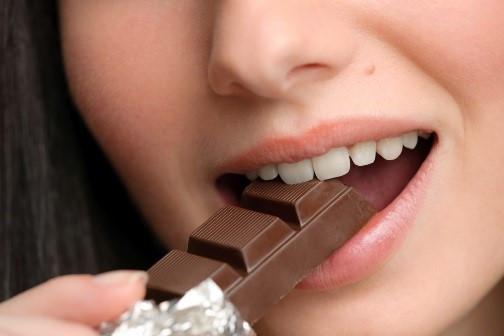I know this is going to make a lot of chocolate lovers very happy.
A recent study has shown that chocolate may boost your ability to exercise!
The key appears to be in a substance called epicatechin, which is a plant nutrient found in cocoa.
Epicatechin prompts cells that line your blood vessels to release extra nitric oxide. Nitric oxide helps widen your veins and arteries (vasodilation) which in turn improves blood flow and cardiac function—both factors that are crucial to physical activity.
Nitric oxide also triggers your muscle cells to absorb more blood sugar (providing them with more energy) and promotes the passage of needed oxygen into your cells.
There is a catch, however—the chocolate has to be dark. Dark chocolate is typically rich in epicatechin, and the higher the cocoa content the better.
Not so for milk chocolate which contains far less cocoa than dark, and white chocolate which contains absolutely none.
But wait—there’s more!
Dark chocolate is also known as a prebiotic food.
Prebiotics are nourishment for your probiotics—your population of friendly gut inhabitants.
Keeping your intestinal flora nourished is crucial because there are literally trillions of probiotic bacteria inside of you, and the more you nurture them, the better they will survive, ward off dangerous bacteria and viruses that you ingest, and support strong immune function.
Other delicious prebiotics
There are many other delicious foods that also help support your intestinal flora population!
Fresh fruits and vegetables--unpeeled
Antioxidant compounds called phenols are found just under the skins of fruits and vegetables, and probiotics love to eat phenols.
Plus, fruits and vegetables also contain soluble fiber which helps you in two ways.
First, your beneficial bacteria feed off the fiber, then they produce short-chain fatty acids as wastes. These short-chain fatty acids slow the growth of dangerous bacteria such as E. coli.
Second, you can have a much easier time when nature calls.
Nut and seed mixes
 A blend of nuts and seeds (without added sweeteners) is the perfect prebiotic. Nuts and seeds are great sources of fiber, protein, and dietary phenols.
A blend of nuts and seeds (without added sweeteners) is the perfect prebiotic. Nuts and seeds are great sources of fiber, protein, and dietary phenols.
Dark berry juice
Juices that contain good levels of dietary phenols include those made from blueberries, raspberries, blackberries, cranberries, pomegranates, cherries, and purple grapes.
Just be sure you're buying 100 percent real JUICE -- not a "juice drink" which can contain little or no actual juice.
Herbs and spices
 Practically every herb and spice contains dietary phenols, so spice things up! Oregano is the winner with the highest phenol content.
Practically every herb and spice contains dietary phenols, so spice things up! Oregano is the winner with the highest phenol content.
Oats
Oats are brimming with beta-glucan, which is a soluble fiber and an excellent prebiotic.
Legumes
Legumes include beans, lentils, and peanuts. They're loaded with soluble fiber (as well as protein and minerals). The dietary phenol count of beans is one of the highest per weight of any food in existence!
Green and black teas
Dietary phenols are extracted from tea leaves during the brewing process. Green tea has the highest phenol content, with black tea a close second.
Red wine
I just made your day, didn’t I?
 Moderate consumption of red wine (1-2 glasses) not only helps reduce the risk of cardiovascular disease, but red wine also has one of the highest phenol contents of any food or drink.
Moderate consumption of red wine (1-2 glasses) not only helps reduce the risk of cardiovascular disease, but red wine also has one of the highest phenol contents of any food or drink.
Keep their numbers high, to begin with!
Nourishing your friendly gut flora is only half of the issue…
Because it’s even more important to have a strong population of them, to begin with!
Many factors other than your intake of prebiotics can affect your population of helpful bacteria--stress, medications (especially antibiotics and antacids), toxins in the environment and lack of sleep can all take a toll on your gut microbes.
So it's crucial to supplement with a full-spectrum multi-strain probiotic formula like Super Shield.
In addition to a variety of 13 helpful bacteria strains, Super Shield also contains its very own prebiotic—Fructooligosaccharides (FOS)--which is a type of fiber found in asparagus, bananas, garlic, leeks and onions.
Take advantage of these delicious and helpful ways to support your gut health!










